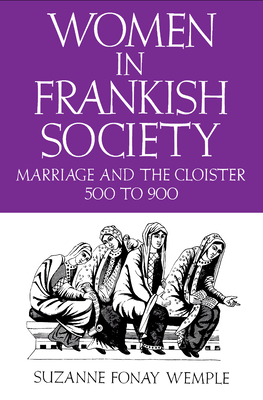

 |

|

The average rating for Women in Frankish society based on 2 reviews is 1.5 stars.
Review # 1 was written on 2008-05-14 00:00:00 Kyong Yoon Kyong YoonGiven that this book was originally written in 1980, I definitely have to give it some leeway in terms of outdated its theoretical structure is. That said, if this were not the only basic introduction to Merovingian women and religion which the university library had to offer, I would not have ploughed through this all the way to the end. I thought the style of her writing was somewhat clunky, many of her conclusions not supported by the material, and flat out disagreed with her views on hagiography. Whoever read the book before me must have agreed, because there are a series of exclamation marks in the margins all the way through the text. I would still have regarded it as an adequate pointer to the relevant primary sources on a field which is new to me; however, even that usefulness was severely hindered by the fact that a number of the footnotes are mixed up, or reference the wrong page of a particular text. This is a definite problem when your Latin is as weak as mine is—I'd really rather not have to go wading through volumes of the Scriptorum rerum merovingicarum in an attempt to find out which line of a vita she actually meant to reference. I really hope I can find something better than this from which to work. |
Review # 2 was written on 2016-01-06 00:00:00 Rob Jenkel Rob JenkelOn the one hand, the author is dispassionate without being disinterested, she has done rigorous research of the documents available, and she is more generous to the Church than most writers. On the other hand, she uses the language of a feminist historian - equality, equal rights, etc. - which is incongruous to the time period. If you don't understand Christianity, then you will not understand Europe during the 4th-8th centuries. As I say, Wemple refrains from vitriol against the Church, which is refreshing. However, she argues that men and women did the exact same things in the early Church, and women were only suppressed as the Church became more organized. Women had more power and freedom in the early Church, and they could do things like travel alone, preach, be witnesses and martyrs, but to say that they did the /exact/ same as men is shortsighted. It doesn't factor in vocations and the sacraments. My jaw hit the floor when she said that "the enforcement of marital indissolubility" was bad for women because it prevented them from acquiring more landed wealth. Never mind that marital indissolubility demonstrably improves the lives and safety of men and women; it's apparently evil because women couldn't get as much wealth. Those mental gymnastics must have been exhausting. I really wanted to like this book, because the author's research and scholarship seems so thorough. I'm a sucker for books that have 100+ pages of footnotes, and Wemple has definitely given me more things to add to my reading list. In her conclusion, she astutely says that many questions about this topic must be answered with "it depends". Policy frequently differed from practice, and practices varied from region to region. She is remarkably generous when discussing the role of abbesses and religious orders. She even calls the Church liberating for women. But then in the next breath she says: The early Church was revolutionary and underground, and women were included in the hierarchy and they wielded power. As the Church grew more organized, women were firmly removed from the hierarchy and repressed. So, not angrily anti-Catholic, just the usual drivel about the Church being mean to women. According to the author, everything that the Church did to women is called an "imposition," "war against," "burden," enforcement," and so on. She starts with a truth - that women were liberated by Christianity, that there were legitimate problems for women when monastic rules were applied to female orders with little consideration for the fact that adjustments should be made, or that there WERE actual problems that the Church needed to work on with her ministry and theology of/to women - and then frustratingly somehow STILL argues that the Church obstructed progress for women. She writes as if being a mother and/or wife was an evil, horrible imposition foisted on women. There's a chance that my own religious biases got in the way while reading, but I'm not taking advice from anyone who thinks marital indissolubility is bad for women. |
CAN'T FIND WHAT YOU'RE LOOKING FOR? CLICK HERE!!!